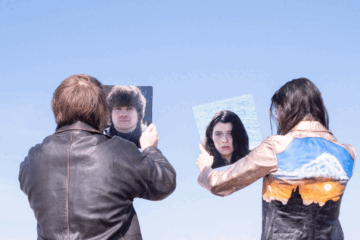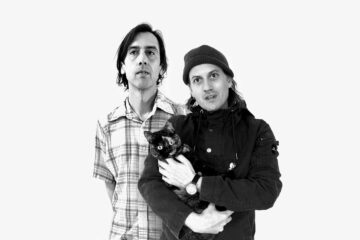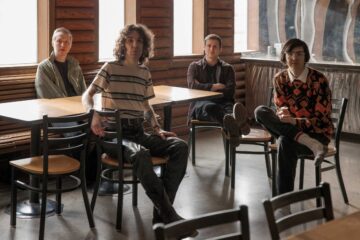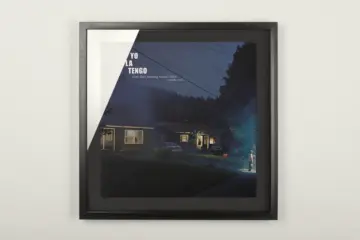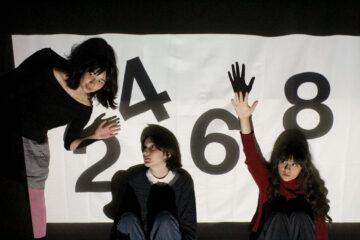It’s 35 degrees and the Zoom connection is steaming. In contrast to the heat is the album that is the reason and subject of this interview. A winter album in summer: frozen streets between crackling hot concrete. The two front figures of Big Thief know how to play with ambivalence. It is not without reason that the new album is called Double Infinity. It can be imagined as two spirals running into each other, never touching, but only forming a shape when they come together. Big Thief’s new music also moves on the threshold between the tangible and the invisible – and thus becomes an attempt to communicate something greater.
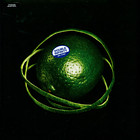
Double Infinity
«Learning to communicate is an act of love,» says Adrienne Lenker. And there is nothing but love in the music of this American indie-folk band from Brooklyn. After several award-winning albums, Big Thief once again succeeds in capturing the tiny moment that can arise between two people: between yesterday and tomorrow, between immanence and metaphysics. Without pathos, carried by a sensitive vulnerability that Lenker translates from her own perspective. In the interview, the two talk about nighttime theater experiences in rainy West Virginia, about coyotes that sound like polyphonic laughter, and about recording sessions that felt like summer camp. They talk about balancing intention and intuition, and how music itself becomes a language that conveys more than words ever could.
Is there a particular sound, place, or moment from the last weeks that has stayed with you?Adrienne Lenker: A night in Thomas, West Virginia, stands out. I was there with my girlfriend and our dogs, just passing through. We arrived at 4 a.m. and stayed at a friend’s place in this small town full of old buildings turned into galleries, right on the river in the Appalachian Mountains. The next morning someone told us about a play in the attic of an old building. We decided to stay. It was pouring rain, the play lasted two and a half hours – funny but also moving. Afterwards we went to a little speakeasy and stayed while the rain kept falling.
It sounds like something out of a 1990s coming-of-age movie.
Adrienne Lenker: Totally. Are we not always coming of age, if we are curious?
That is so true. And I think curiosity is what keeps you from getting cynical.
Buck Meek: Something that has been shaping my days lately: there were huge fires in Los Angeles, where I live in the mountains. The flames came up the canyon for miles and stopped just fifty yards from my house. Everything around burned, so the wildlife – coyotes, mountain lions, bobcats, rabbits – moved into the remaining green space. Now there are huge packs of coyotes around every night. Have you ever heard coyotes laugh?
No, only in the movies.
Buck Meek: It is the most psychotic, beautiful, bizarre sound – like many people laughing, crying, and screaming at once. It sounds like sirens. They do it when they are feasting. It is wild, but also beautiful. Our husky, Ringo, is obsessed with them. I think she wants to join the pack.
When you enter a recording space together, what sets the emotional or creative tone? Is it something you consciously do, or does it just happen between you?
Adrienne Lenker: Every session is different. This time we thought a lot about how we wanted the record to feel, and who to invite. We chose an old Manhattan studio in winter, big enough for everyone. There were eleven or thirteen people – including Laraaji, who brings such high-vibration energy. Just being in a room with him set the mood. He is an incredible listener, very present, and so were the others. It felt like summer camp.
Buck Meek: We really put intention into every part – from the songs Adrienne had been writing for years, to choosing the players and the space, even the food. We brought candles and velvet blankets. Adrienne sang with Elena Spanger, Hannah Cohen, and Jim McDoom, who had their own room. We prepared the stage, but once everyone arrived, we let go. We trusted the preparation and stepped outside our comfort zones, with people who could really listen.
Has there been a moment when the energy felt completely different than expected, where you had to adapt?
Adrienne Lenker: We had a vision, but no expectations. We did not know what it would sound like. We went in open, and it shaped itself.
Buck Meek: The surprise was how easy it was. With so many people, it became a culture, a community lifting each other up. Everyone played something simple, responded to each other. It felt weightless.
How did playing with so many musicians affect your sense of vulnerability or connection while recording?
Buck Meek: It felt less vulnerable. In smaller sessions there is more space for fear, I overthink. Here, with so much going on, I was not thinking about myself at all.
Adrienne Lenker: For me, it was more vulnerable. I am used to my bandmates – we have played together for ten years. But since Max left, it is just Buck, James, and me. That was a catalyst to move into a new era. Many in the session I had never played with. I hoped they would like the songs. It was unfamiliar – but good to let go.
How do you actually start a song – from the very beginning?
Adrienne Lenker: For this album, the songs were already formed when we entered the studio. I worked on vocals with Elena, Hannah, and Jim, while Buck and James created grooves in the main room. Then we came together – “girls’ team” and “boys’ team” – and sang with whatever they had. We jammed until the tape ran out. No talking, just instinct.
Buck Meek: If you mean the very start – I have often watched Adrienne write. She makes space for it: phone away, door locked, not leaving until it is done. That focus is essential. She starts with guitar, finding chords and melodies, then mumbling abstract sounds. Words grow out of those sounds.
»We live in finite bodies, not knowing where we came from or where we are going. It is a dance between effort and grace.«
Adrienne Lenker
There is something I noticed in the album – a balance between dedication and planning, and on the other side, openness and letting go. Was that intentional, or did it emerge naturally?
Buck Meek: Thank you for saying that – it’s a beautiful reading. We value oscillating between intention and intuition. A phase of precision, then a phase of trusting instincts. We go back and forth – throwing ideas, stepping back, refining.
Adrienne Lenker: That mirrors life. We live in finite bodies, not knowing where we came from or where we are going. It is a dance between effort and grace. There are forces stronger than us, but if we align with them, we reach places we could never find alone. It is like turning a sail into the wind – fight it, and you go nowhere; align with it, and you are carried.
Der Albumtitel Double Infinity wirkt nach dem, was ihr sagt, noch treffender – wie eine Endlosschleife der Menschheit. Wir wissen, dass wir sterben, und begreifen es erst, wenn es geschieht.
Adrienne Lenker: Und die zwei Unendlichkeiten sind alles, was unendlich außerhalb unseres Körpers liegt – das Universum, die Sterne – und alles unendlich nach innen: unsere inneren Welten, die mikroskopische Ebene. Ich denke manchmal, der Körper ist die Brücke zwischen äußerer und innerer Unendlichkeit. Jeder Teil enthält das Ganze.
The album title Double Infinity feels even more fitting – like an endless loop of humanity, repeating the same truths. We know we are going to die, yet we cannot fully grasp it until we experience it.
Buck Meek: That’s exactly how it feels to be alive – in between.
Adrienne Lenker: And it’s difficult to translate everything you feel. That’s why I can appreciate every effort. But the work that really hits you in the gut – clearly translating the human experience – is difficult. The more you practise communicating the specifics of your experience, the more universal it can become.
Related reviews
And that is how we get closer to each other. We can never escape our body, so we have to translate our subjective experience. It is like two parallel lines that never meet, but grow closer – and for me, that is what love is.
Adrienne Lenker: That is where the magic happens.
Buck Meek: All those intersection points follow the same principles.
Adrienne Lenker: And it is a practice. To feel closer, you must stay present, choose to be in your body every day. I dissociate a lot from trauma, so inhabiting my body takes effort. Learning to communicate is an act of love.
And the opposite of what is happening in the world right now. People are not really listening – they only want to share their opinion.
Buck Meek: Exactly. That is why music is powerful. Playing with people – even those you barely know – creates a safe way to communicate. With Laraaji, John, and Elissa, I got to know them through sound, not small talk. So much is transmitted through music.
Adrienne Lenker: It is a language you cannot replicate elsewhere – something transcendent that also brings you back to the body.
I think we have covered everything I wanted. The conversation took a beautiful turn.
Adrienne Lenker: It was lovely talking to you.


